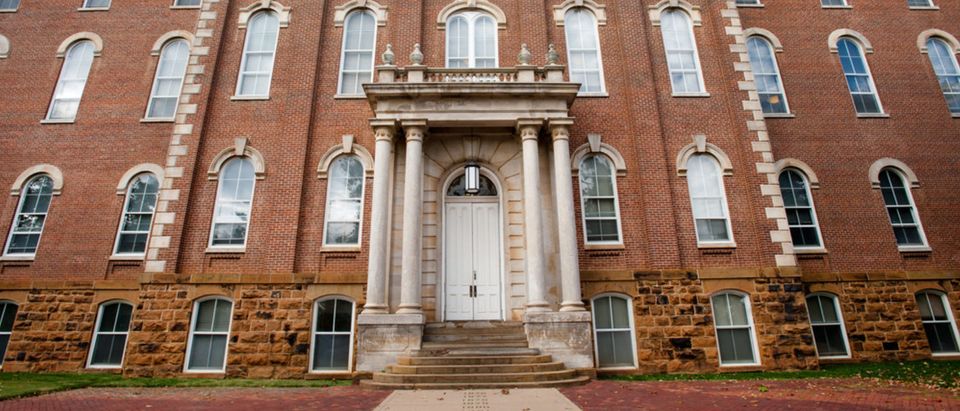University of Arkansas is receiving heated criticism for a policy proposal that professors claim could make it possible to fire professors for not being “cooperative” or simply being conservative.
Professors allege that the university is using non-academic attorneys to draft the changes and that there is evidence suggesting that the school is trying to move swiftly to implement the changes before university faculty can sufficiently challenge them, according to correspondence obtained by The Daily Caller News Foundation.
“The policy actually goes much further than using collegiality as a standalone factor in annual reviews: it uses collegiality as a standalone basis for termination (writer’s emphasis),” said Joshua Silverstein, a law professor at the University of Arkansas at Little Rock, in an email to UA faculty. “Here again is the language from the proposal: ‘A faculty member may be…dismissed…for cause on grounds including…unwillingness to work productively with colleagues.’ That smuggles in collegiality and a whole lot more. And thus collegiality is a basis for dismissal independent of the annual review process.”
Silverstein has speculated that the proposed changes could be detrimental to minorities of any variety, including conservatives, who comprise a minority in higher education. The policy proposal includes eight ambiguously-worded causes of termination such as demonstration of a “pattern of disruptive conduct or unwillingness to work productively with colleagues” and “unethical conduct related to fitness to engage in teaching.” (RELATED: University Of Arkansas Tenure Policy Could Make It Easier To Fire Conservative Profs)
“The proposal permits termination if a faculty member is not sufficiently ‘cooperative,’ said Silverstein, speaking with TheDCNF. “It takes little imagination to see how such a standard will be used to deem ‘uncooperative’ faculty who express unpopular views in their teaching and research.”
The law professor said that the issue was the most controversial higher education issue in the state since he moved to Arkansas over a decade ago. He also said the proposal will impair faculty retention and recruitment, as the university will need to explain its constricted tenure rights to prospective candidates and a “brain drain” will be triggered when the proposed changes, if passed, cause current faculty to leave. Silverstein took issue with the drafters of the policy, asserting that the university was using non-academic attorneys.
“Allowing attorneys to draft the fundamental rules that govern academic freedom in a university setting makes about as much sense as letting attorneys draft principles of medical ethics, or letting architects design the rules of evidence in court,” said Silverstein to TheDCNF.
Robert Steinbuch, another UA law professor, told his fellow faculty members that even UA’s own attorney described the proposed change as “limiting and may be controversial,” in electronic comments made on the policy document uncovered with a Freedom of Information Request filed by Silverstein and obtained by TheDCNF.
“University counsel asserts that the proposal will apply retroactively to tenured faculty, because tenure will still be protected by ’cause,'” said Steinbuch in an email to UA faculty. “But counsel seeks to change that very definition of ’cause.’ That’s like making a contract to buy a blue Chevy and receiving a red Honda. You still have the contract for a car, just the terms are entirely changed. That’s not valid and will undoubtedly lead to litigation.”
The policy changes “were formulated with little or no faculty input,” said C. Earl Ramsey to TheDCNF. Ramsey is a 50-year veteran professor who taught at Yale University, Bryn Mawr College, and Little Rock. He directed the school’s honors program, served as vice president of UA’s faculty senate, and is retired but still teaches some classes.
The faculty “learned about these rule changes very late in the process, far too late for meaningful input; there is substantial evidence that the timing was designed to get the changes through the Board of Trustees before the faculty could adequately challenge them,” Ramsey told TheDCNF.
Ramsey agreed with Silverstein’s beliefs that the proposed changes would impair UA’s retention and recruitment and also disputed the provision concerning “collegiality,” asserting that only one negative review of a faculty member could lead to his or her dismissal.
Silverstein said that the University of Arkansas’ board of trustees could vote on the proposal as early as its January 2018 meeting. TheDCNF reached out to the board, but received none in time for press.
“The UA System has been working for several years to update a good number of its policies to bring them up to current law and practice standards,” said Nate Hinkel, a UA spokesman, to TheDCNF.
“Though the UA System was originally aiming to propose a revised version at last week’s Board of Trustees meeting, we realized that more feedback was still coming in and that further discussion was necessary.”
Hinkel said that UA would be taking public comments, which can be sent through a FAQ document.
Follow Rob Shimshock on Twitter
Connect with Rob Shimshock on Facebook
Send tips to rob@dailycallernewsfoundation.org.
All content created by the Daily Caller News Foundation, an independent and nonpartisan newswire service, is available without charge to any legitimate news publisher that can provide a large audience. All republished articles must include our logo, our reporter’s byline and their DCNF affiliation. For any questions about our guidelines or partnering with us, please contact licensing@dailycallernewsfoundation.org.


